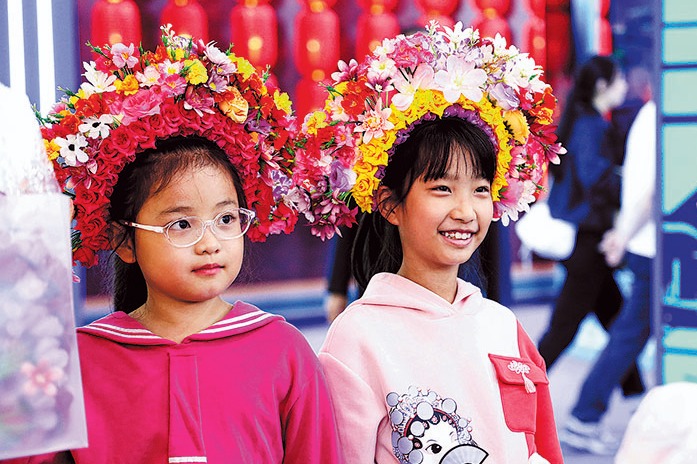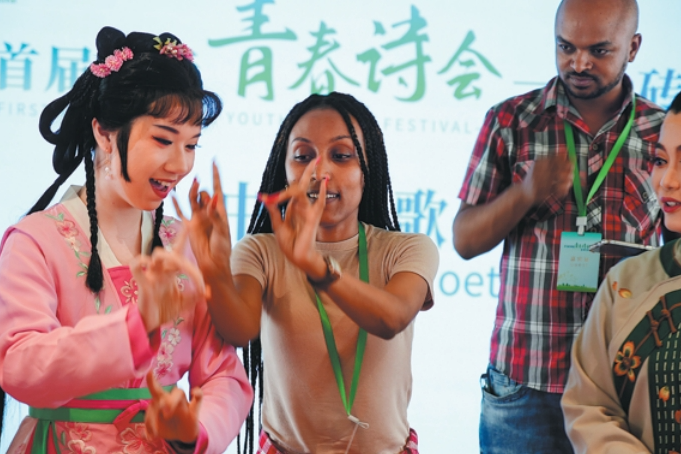Foreigners seek advice on social media

Want a new look? A different hairstyle? Can't trust any one opinion? You probably need to seek help on Xiaohongshu, or the Little Red Book.
Thousands of internet users from around the world are turning to the social media lifestyle platform for advice. Holding up a piece of paper bearing the Chinese characters tingquan — which means listening to advice — they are posting their earnest queries and getting answers by the dozen.
Take for example 21-year-old Elmanu from Germany, who in a recent post on the platform thanked Chinese netizens for their advice, which helped him improve his image. "I received far more comments and suggestions than I had imagined, many of which were very helpful," he wrote.
In February, he posted for the first time, seeking advice on his hairstyle and clothing, and providing his height, weight and photos. The post triggered over 800 likes and more than 600 comments, in Chinese and English, with some users even sending him photos of hairstyles and outfits to help him make up his mind.
In his latest post, he shared photos of his new look, mentioning that he had changed his hairstyle, bought new clothes and no longer wore glasses. He also posted updates about his life and said he had started learning Chinese.
People from all over the world are popping up under the hashtag tingquan. They usually introduce themselves in Chinese and put forward what style aspect they need advice on. What follows is direct, brutal and honest advice from Chinese netizens.
The trend can be traced back to a popular video posted earlier on TikTok by a blogger named Candiselin86, who shares posts on Chinese culture. She uploaded screenshots from Xiaohongshu, which showed pictures of people who had transformed their image by acting on the online advice they received.
Overseas users soon began flocking to the Chinese platform under the tingquan tag, seeking suggestions and then sharing their experiences on TikTok.
"When you can't make up your mind and there's no one around to ask, you can just post something online and see if anyone can offer advice," said Felicia Ngan Wei Wei, from Malaysia.
"Most of the time, I find that netizens are quite enthusiastic and provide many genuine suggestions."
A senior student at Tianjin University, Ngan developed a keen interest in studying in China when she was about to graduate from high school.
Xiaohongshu has become her most frequently used social app, where she finds information on hairstyles, fashion and other daily interests. She said that in Malaysia, many people, even those who have never been to China, enjoy using it.
Zhang Xiaoqiang, a professor at Chongqing University's School of Journalism and Communication, said that for foreign users, the Chinese social media platform offers a unique textual and cultural experience.
In recent years, Chinese social media and e-commerce platforms have transitioned from imitating foreign models to inspiring imitations abroad. Apps like Douyin and Pinduoduo have successfully launched platforms overseas, leveraging their success in China, Zhang said.
Whether on Xiaohongshu or Douyin, there are many foreign users who live in China for study, work or relationship reasons. However, Chinese language-dominated platforms have not placed significant emphasis on international users, he said.
The domestic platforms could consider expanding into the global market by offering features like multilingual translation and page design to cater to non-Chinese users, Zhang said, adding that once the foreign user base grows, the international expansion of Chinese-language social media platforms will happen naturally.
Today's Top News
- Growing appeal shows relevance of group, expert says
- Arab League seeks action against Israel
- AI a frontier for education and innovation
- China, Laos vow to advance cooperation
- Mechanism paves way for economic recovery
- Chinese NGOs aim to make bigger intl impact






























